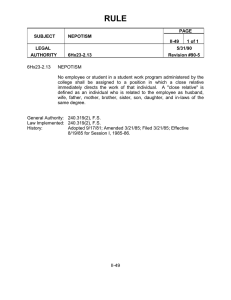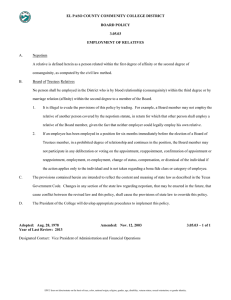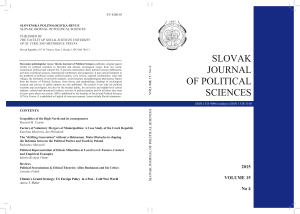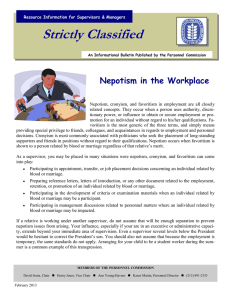legal issues associated with nepotism in the workplaces in the
advertisement
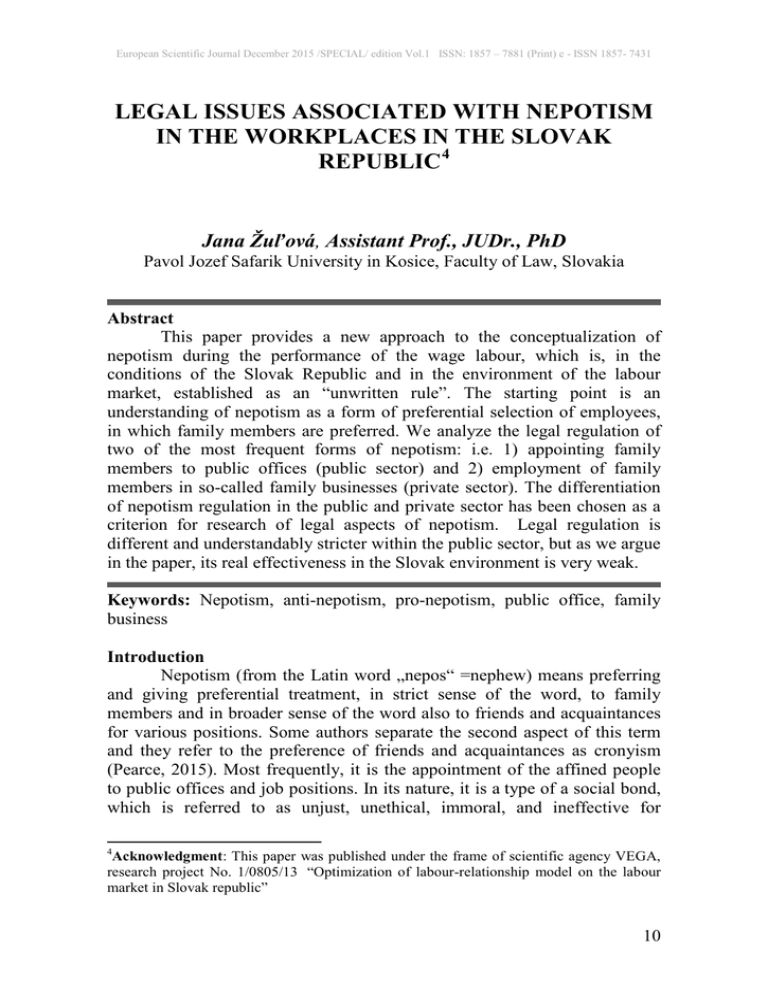
European Scientific Journal December 2015 /SPECIAL/ edition Vol.1 ISSN: 1857 – 7881 (Print) e - ISSN 1857- 7431 LEGAL ISSUES ASSOCIATED WITH NEPOTISM IN THE WORKPLACES IN THE SLOVAK REPUBLIC 4 Jana Žuľová, Assistant Prof., JUDr., PhD Pavol Jozef Safarik University in Kosice, Faculty of Law, Slovakia Abstract This paper provides a new approach to the conceptualization of nepotism during the performance of the wage labour, which is, in the conditions of the Slovak Republic and in the environment of the labour market, established as an “unwritten rule”. The starting point is an understanding of nepotism as a form of preferential selection of employees, in which family members are preferred. We analyze the legal regulation of two of the most frequent forms of nepotism: i.e. 1) appointing family members to public offices (public sector) and 2) employment of family members in so-called family businesses (private sector). The differentiation of nepotism regulation in the public and private sector has been chosen as a criterion for research of legal aspects of nepotism. Legal regulation is different and understandably stricter within the public sector, but as we argue in the paper, its real effectiveness in the Slovak environment is very weak. Keywords: Nepotism, anti-nepotism, pro-nepotism, public office, family business Introduction Nepotism (from the Latin word „nepos“ =nephew) means preferring and giving preferential treatment, in strict sense of the word, to family members and in broader sense of the word also to friends and acquaintances for various positions. Some authors separate the second aspect of this term and they refer to the preference of friends and acquaintances as cronyism (Pearce, 2015). Most frequently, it is the appointment of the affined people to public offices and job positions. In its nature, it is a type of a social bond, which is referred to as unjust, unethical, immoral, and ineffective for 4 Acknowledgment: This paper was published under the frame of scientific agency VEGA, research project No. 1/0805/13 “Optimization of labour-relationship model on the labour market in Slovak republic” 10 European Scientific Journal December 2015 /SPECIAL/ edition Vol.1 ISSN: 1857 – 7881 (Print) e - ISSN 1857- 7431 organizations, and has been noted to create specific types of conflicts of interests that distorts the principle of equality (Jones, Sttout, 2015). Specifically, broad possibilities of the rise of personal and public conflict of interests are provided by the public sector (in the Slovak Republic the performance of work in the public interest and public administration). Nepotism and preferential treatment of family members in filling public offices has a negative effect, which threatens the public’s trust in the public sector. Negative effects on the morale of society and negative economic effects have been proven when large family clans take over public functions, which results in the distribution of public resources to other relatives or other affined parties (David, Nett, 2007). In this sense, the nepotism is an example of indirect corruption behaviour. In order to avoid these problems, the majority of countries have adopted a so-called anti-nepotism policy, which prohibits, in certain forms, the employing family members in public positions. Slightly less developed is the legislation of individual countries in relation to the anti-nepotism enforcement in the private sector, which is controlled by the principle of contractual autonomy (Janičová, 2006). The approach where the policy of anti-nepotism in the private sector is not regulated on a national level, but rather based on the contractual autonomy left up to the will of the employer, has certain risks. The rules of anti-nepotism applied by the employer, such as prohibitions on employing married couples in the workplace, sanctions for a romance between colleagues, etc. are disconcerting, because they can easily threaten the employee’s right to privacy, marriage, family, and intimate life (Rabin Margalioth, 2006). There are also examples where the employer, by applying these policies, has committed a discrimination based on sex (Gutman, 2012). In the majority of cases, it’s especially women who give up their job, in the event they cannot work together with their husband in the same workplace due to the anti-nepotism rules. In the first part of this paper we present the legal characteristic of valid rules of anti-nepotism in the public sector and we subject them to critical analysis. In the second part of the paper, we explore legal aspects of nepotism in the private sector with particular emphasis on its most frequently occurring form, family businesses. We focus on the legal regulation of a mutual employment of married couples and other relatives, in which we can find even an element of pro-nepotism as a rule, which supports the employment of family members. Legal aspects of nepotism in the public sector In the course of performance of the work in public interest in the Slovak republic, it is prohibited to employ employees who are relatives and employees and individuals performing public functions who are relatives, in 11 European Scientific Journal December 2015 /SPECIAL/ edition Vol.1 ISSN: 1857 – 7881 (Print) e - ISSN 1857- 7431 mutual direct subordination or superiority or so that the one would be subjected to accounting controls or financial controls of the other (§ 7 of the Act No. 552/2003 Coll., on the work in the public interest, as amended, hereinafter referred to as the Act on the work in the public interest). Similarly, based on provision § 30 of Act No. 400/2009 Coll. on the State service as amended (hereinafter referred to as Act on the State service), the state employees, who are relative persons, cannot be assigned in the mutual direct subordination or superiority or so that the one would be subjected to accounting controls or financial controls of the other. Stated restrictions on employing relatives in the public sector do not apply to employees of representative offices of the Slovak Republic abroad, or employees who have only one managing employee, which is a statutory body. If the employer has only one managing employee, who is simultaneously a statutory body, relatives can be assigned in the mutual direct subordination or superiority or so that the one would be subjected to accounting controls or financial controls of the other. Based on the first definition, a relative is a relative in direct relation (i.e. grandfather – father – son), sibling, or spouse. Based on the second definition, a relative is a person, where in the case when other people in family relations or similar relations are close enough to one another, that if one person suffered harm, the other one would justifiably experience it as its own. An undisputed positive of the Slovak policy of nepotism and paradox at the same time is the fact that not only filling of public offices by relatives, based on blood relations and family relations established by marriage is restricted. Based on the second definition, a relative can also be a homosexual partner of the employee, so it prohibits their mutual employment in the relation of subordination or superiority. On the other hand, there is the broadly known resistance of the Slovak society against acknowledgement of any rights for cohabitation of same-sex couples or in even the legal acknowledgement of their cohabitation. (Žuľová, 2014). However, the real efficiency of the Slovak policy of anti-nepotism in relation to an effective solution of this issue is very low. Observations of the prohibition of employing relatives in only two lines (1) mutual direct superiority or subordination, (2) accounting control and financial control, does not prohibit the appointing of relatives to other lucrative positions. Limiting the prohibition of employing relatives to a circle of family members (see the definition above) makes it easier to employ a broader circle of relatives in the sideline – cousins, brothers-in-law, sisters-in-law, and fathers-in-law. Relations through the sideline may meet the criteria of the second definition of relatives, but only after proving that if one of these persons were to suffer harm, the other one would justifiably experience it as its own. To claim the opposite is much easier than to bear the burden of proof of fulfilling the characteristics of a related person, based on the second 12 European Scientific Journal December 2015 /SPECIAL/ edition Vol.1 ISSN: 1857 – 7881 (Print) e - ISSN 1857- 7431 definition. The formal prohibition of employing in mutual superiority or subordination is also very easily circumvented. Infamously known is the case of a mayor of a Slovak village, who in the interest of preserving the job position of his wife, purposefully appointed the head of the local authority to the office, on a part time basis, who thus became her formal superior. In relation to the prohibition on assigning employees in the mutual direct subordination or superiority or so that the one would be subjected to accounting controls or financial controls of the other, the Act on the State service established a “preventive „mechanism, where the citizen applying for the state service position is obliged to inform the service office of these relevant facts. The state employee commits to notify and inform the service about these facts even in cases when they arise during the performance of the state service. The notification duty does not apply to relations in all of their scopes; only in cases where a relation of a direct subordination or superiority, or accounting and/or financial controls, would arise in the workplace by assigning the relative thereto. In regard to the ineffective rules of anti-nepotism in the Slovak public administration, it is necessary to point out the ongoing non-existence of termination of employment, due to the fact the there is an illegal work relationship among related people. The obligation of the employer is to perform a legally relevant restitution action, which, pursuant to the Slovak legislation, can be an assignment of the related employee to another job, but an explicit cause of termination of the employment is missing. Regulation of the anti-nepotism rules is also missing, in the event the family members are employed in mutually subordinate institutions (Nemec, Pirošík, Slimáková, 2001). After all, it is necessary for the legal regulation to eliminate one more manifestation of nepotism. Any hiring of an employee who is related to someone within the organization structure of the employer is also oversensitively viewed as nepotism. One of the first studies which dealt with the consequences of nepotism for the recipient of the advantage (family member, which succeeded in the selection process) confirms the results that their success is always attributed more to their political capabilities and relations to higher management and less to their skills, effort and education (Padgett, Padgett, Morris, 2015). Family members bear a stigma of negative perception of their relation as an advantage, which helped them in the selection process to get the public office or job position, irrespective of their actual qualifications, capabilities and skills. In our opinion, the above stated imperfections of legal anti-nepotism rules in the Slovak republic shall leave the legal basis and seek the institutional solution. Objective selection of public administration employees, based on binding ethical principles and meritocracy could be made by, e.g. an independent institution. 13 European Scientific Journal December 2015 /SPECIAL/ edition Vol.1 ISSN: 1857 – 7881 (Print) e - ISSN 1857- 7431 Legal aspects of nepotism in the private sector Nepotism in so-called family businesses is viewed more naturally, although not positively. The owners of family businesses frequently establish these within marital or sibling relationships and expect their descendant or relatives to be continuators of the family business. Family business and expectations related to their operation are based on the cooperation of the bearers of the same genes. The more genetically close the people (parents – descendants, siblings) the greater the willingness to cooperate, irrespective of the risks related to given cooperation (Nowak, Highfield, 2011). In many countries, the culture, practice or even legal regulations do not explicitly prohibit the cooperation among relatives within individual workplaces. It is up to the employer to what extent he will start the “family cooperation „in his workplace. While in the case of nepotism in the public sector, the normative measures of the Slovak Republic are focused explicitly on countering it, in the private sector, one may find also legal standards for its support, i.e. one may speak about legal standards of pro-nepotism (Gutman, 2012). The Slovak Republic is one of the countries, which allow concluding employment relations between the husband and wife since 2003. Until then, the Act No.311/2001 Coll. of the Labour Code as amended (hereinafter referred to as Labour Code) explicitly prohibited the mutual employment of spouses. According to the applicable legal regulations (Act No. 82/2005 Coll. on Illegal work and illegal employment), husband/wife can be gainfully employed for one another even without the employment agreement. The cumulative conditions for the work of husband /wife without employment grounds in order not to be considered as illegal employment are: e.g. 1) pension insurance or drawing the pension benefit by the husband/wife and ad 2) performance of work for a natural person, which is an entrepreneur. According to the legislation of the Slovak Republic, a relative other than husband/wife can perform work for the employer – natural person without signing a contract only if it is a relative in direct descent, though the relation can also be established by adoption. Relatives in the sideline include only siblings, irrespective of the fact whether they are a step or natural sibling (whether they have one common parent (half siblings) or they have common both parents (siblings)). The employment of other relatives in the sideline like, cousins, uncles and nephews shall be realized on a contractual basis. In comparison, Czech Republic belongs among the countries that prohibit mutual employment of spouses. The prohibition of establishing an employment relationship between husband and wife in the conditions of the Czech Republic relates only to employers, who are natural persons. It is possible for the husband to employ his wife (or vice versa the wife the husband) in a company even though he himself, as the statutory body of the 14 European Scientific Journal December 2015 /SPECIAL/ edition Vol.1 ISSN: 1857 – 7881 (Print) e - ISSN 1857- 7431 company, would sign the employment agreement with her. In such cases, the employment relationship is agreed not between the husband and the wife, but between the company and the spouse, which, from a legal standpoint, is a different subject than the husband/wife. As an essential argument why husband and wife should not be allowed to establish employment relations is the subordinate principle, because this characteristic sign of each employment relation comes into contradiction with the family law principle of equal position of the man and woman in marital relations (Macková, 2012). Superiority of the employer and subordination of the employee plays a key role amongst other identifiers of wage labour, or for the identification of who is the employee and even the Court of Justice of the European Union uses it as one of the main elements with the aim of providing a definition of an employee for the purposes of free movement (Dolobáč, 2012). However, in our opinion, the relation of subordination of an employee in the employment relationship towards the employee cannot be a priori excluded only because of the fact that the employee is in a marital relation to the employer. 5Another troublesome aspect listed as a barrier for mutual employment of husband and wife is the respect of the work performance of someone else, i.e. “on someone else’s account“, when the married couple usually works in a regime of undivided co-ownership of spouses. The existence of the undivided co-ownership of the married couple causes the fact that the husband – employer uses financial resources, which are part of the undivided co-ownership and further remain part of the undivided coownership, to pay the wage. Even according to the Spanish science of the Labour law, working on one’s own account is outside of the scope of the labour law (Megino Fernandez, 2014). However, in our opinion joint ownership itself does not exclude the performance of work between a husband and a wife from the scope of the labour law. The undivided coownership weakens the identification of the attribute of performing work for someone else, but several of its aspects are still upheld – e.g. economic risk of the activity is still borne by the employer and he also bears the legal responsibility for the result of the work. We also agree with the opinion that the prohibition of employment relation between spouses has no grounds in the present anti-discrimination legislation, which in the Czech Republic, but also the Slovak republic, explicitly states the prohibition of discrimination based on marital or family status (Borská, Světlíková, 2015). Whether the employer decides to employ his wife or not, he should not be prohibited by the legislation to do this. 5 Acknowledgment:Decision of the Court of Justice of European Unionfrom 08. &june 1999 in the case ofC-337/97, C.P.M Meeusen proti Hoofddirectie van de InformatieBeheer Groep. p. 17. 15 European Scientific Journal December 2015 /SPECIAL/ edition Vol.1 ISSN: 1857 – 7881 (Print) e - ISSN 1857- 7431 Conclusion: Nepotism is an issue in every society and no country is completely immune from it with respect to its natural occurrence due to human nature (Bayley, 1966). Although this form of approach towards public offices and job positions was natural in the past (Sidani, Thornberry, 2013), currently it does not comply with the democratic way of the power organization and therefore, is subject to restrictive legal regulation, especially in the public sector. Because of several issues, which we have analyzed in the first part of this paper, the real efficiency of the Slovak policy of nepotism, in its relation to being an effective solution to this issue, is very low. The private sector is controlled by the contractual autonomy regarding these questions in the legislation of the Slovak Republic. It allows for mutual employment of spouses and other relatives, which does not create any formal barriers to a family business. On the other hand, the employer who wants to avoid issues related to nepotism (Stewart, 2003), the Slovak system of law does not prohibit him in restricting the employees from creating personal and intimate contacts in common workplace by means of internal company standards. The only barrier, the employer has to respect when executing the policy of antinepotism, is the prohibition of discrimination based on marital or family status and human dignity of each employee (Barinková, Žofčinová, 2013). References: Barinková, Milena and Žofčínová, Vladimíra. Social Status of an Employee in the Context of Social Legislation. In: Iuset Administratio. No. 2,pp. 4-14. Available at: http://iusetadministratio.eu/22013-485.html. Byley, David H. The Effects of Corruption in a Developing Nation, The Western Political Quartely, r. XIX, č. 4, p. 526., 1996. Borská, Jana and Světlíková, Daniela. Exclusion of employment relation according to Con. § 318 Act. 262/2006 Coll., Labor Code and equal opportunities. IN: Harmonizing private and family life. The Ombudsman. Brno, pp. 81–91, 2015. Dolobáč, Marcel. Free movement of workers in the EU. In: Legal and administrative studies. Vol. 2, no. 4, pp. 57-68, 2012. David, Vladislav and Nett, Alexander. Corruption in international, Europeanand Czech law. Prague: C. H. Beck, pp. 59 and next, 2007. Gutman, Arthur. Nepotism and employment law. In: R. G. Jones (Ed.), Nepotism in organizations, New York: Routledge, pp. 93–128, 2012. Janičova, Eva. Towards basic question of contractual freedom in labor law. In: Current law questions: Almanac issued on the occasion of the life anniversary of prof. Jozef Suchoža. Košice: P. J. Šafárik University in Košice, pp. 269-279, 2006. 16 European Scientific Journal December 2015 /SPECIAL/ edition Vol.1 ISSN: 1857 – 7881 (Print) e - ISSN 1857- 7431 Mackova, Zuzana. Wage Labour, its aspects and insurance relations. In: Labor law 2012 on the topic Wage Labour and its forms. Brno: Masaryk University, p. 148, 2012. Megino Fernández, Diego. Derecho del trabajo, Udima, p. 79, 2014. Nemec, Juraj, Pirošík, Vladmír, Slimáková, Ľubica. Conflict of interests on the state power level.Transparency International Slovakia, 2001. Available at: http://www.transparency.sk/wp-content/uploads/2010/01/030805_knfli.pdf. Nowak, Martin and Roger Highfield. Super cooperators: evolution, altruism and human behavior or Why we need each other to succeed. Edinburgh [etc.]: Canongate, pp. 19 – 112, 2011. Padgett, Margaret Y., Padgett, Robert J., Morris, Kathryn A. Perception of Nepotism Beneficiaries: The Hidden Price of Using a Family Connection to Obtian a Job. In: J Bus Psychol, 30, pp. 283-298, 2015. Olšovská, Andrea and Švec, Marek. Disrespect for Labour Law or social rights in jeopardy. In:In: Labour - law elements of the performance of dependent work. The criticism and deformation of law. Košice. University of P. J. Šafárik, pp. 89-99, 2015. Pearce, Jone L. Cronyism and Nepotism Are Bad for Everyone: The Research Evidence. Industrial and Organizational Psychology, 8, pp 41-44, 2015. Rabin-Margalioth, Sharon. Love at Work. Duke Journal of Gender Law & Policy, 2006. Available at SSRN: http://ssrn.com/abstract=878472. Robert G. Jones, Robert, G. and Stout, Tracy. Policing Nepotism and Cronyism without Losing the Value of Social Connection. Industrial and Organizational Psychology, 8, pp 2-12, 2015. Sidani, Yusuf M. and Thornberry, Jon. Nepotism in the Arab World. An Institutional Theory Perspective. In: Business Ethics Quarterly Volume 23, Issue 1, pp. 69-96, 2013. Stewart, A. Help one another, use one another: Toward an anthropology of family business. Entrepreneurship Theory and Practice, 27, pp. 383-396, 2003. Žuľová, Jana. Diversification of family forms in the reflection of employment relations. In: Labor Ipse Voluptas: Honnoring HelenaBarancova.Krakow. Slovak Association in Poland. 2014. 17
